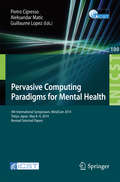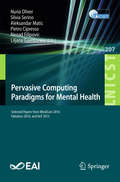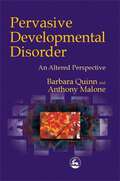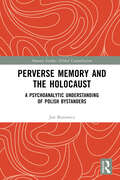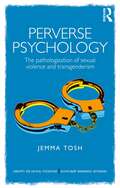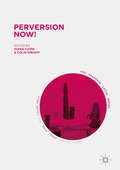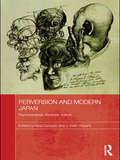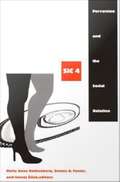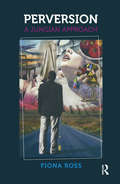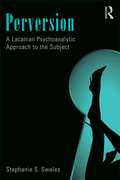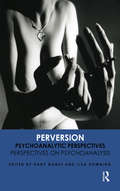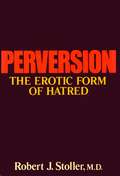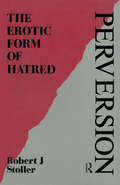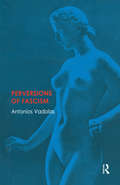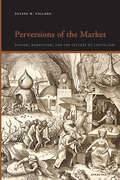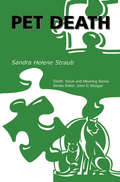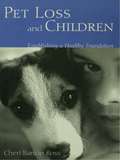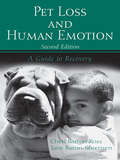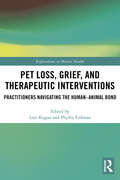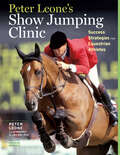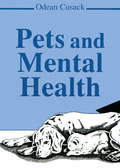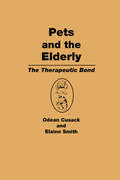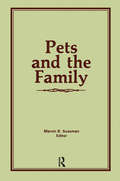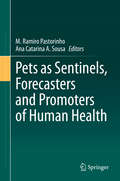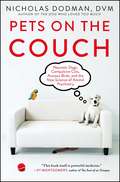- Table View
- List View
Pervasive Computing Paradigms for Mental Health
by Aleksandar Matic Guillaume Lopez Pietro CipressoThis book constitutes revised post-proceedings of the 4th International Symposium on Pervasive Computing Paradigms for Mental Health, MindCare 2014, held in Tokyo, Japan, in May 2014. The 11 full and 5 short papers presented were carefully reviewed and selected from 26 submissions for inclusion in the proceedings. The papers are organized in topical sections on recognition and assessment, mental health management, improving communication, depression, and self-applied treatments.
Pervasive Computing Paradigms for Mental Health: 4th International Symposium, Mindcare 2014, Tokyo, Japan, May 8-9, 2014, Revised Selected Papers (Lecture Notes of the Institute for Computer Sciences, Social Informatics and Telecommunications Engineering #100)
by Liljana Gavrilovska Silvia Serino Aleksandar Matic Pietro Cipresso Nenad Filipovic Nuria OliverThis book constitutes the refereed proceedings of the 6th International Symposium on Pervasive Computing Paradigms for Mental Health, MindCare 2016, held in Barcelona, Spain, in November 2016, and the Second International Conference of Future Access Enablers of Ubiquitous and Intelligent Infrastructures, Fabulous 2016, Belgrade, Serbia, October 24-26, 2016, and the Third International Conference on Interoperability in IoT, IIoT 2015, Rome, Italy, October 26-27, 2015. The 24 papers were selected from 32 submissions. MindCare presents technologies in favor of maintaining and improving psychological well-being. Fabulous presents broad areas of future wireless networks, ambient and assisted living and smart infrastructures in order to interact, exchange ideas, expertise, experience and know-how. And finally IIoT presents tools and services in home automation and industrial service.
Pervasive Developmental Disorder: An Altered Perspective
by Anthony Malone Barbara H. QuinnPervasive Developmental Disorder, or PDD, is the umbrella term used to cover the whole family of autistic spectrum disorders - including autism and Asperger Syndrome. Within this group there is a subgroup called NOS - not otherwise specified - which covers the conditions which do not quite meet the diagnostic criteria for autism or Asperger Syndrome. Because PDD covers such a wide spectrum, it presents very differently from child to child. Written principally for parents, this is a book which explains what it means for your child to be diagnosed with PDD, NOS, autism or Asperger Syndrome, and where you go from there. The authors describe the symptoms of PDD, what a diagnosis means, how a child fits into the diagnostic terminology and the diagnostic procedures involved. They also review associated disorders such as OCD, and discuss the different treatments and therapies available. The book includes frequently-asked questions, as well as the experiences of other parents. It is accessible, informative and supportive, a practical introduction to PDD.
Perverse Memory and the Holocaust: A Psychoanalytic Understanding of Polish Bystanders (Memory Studies: Global Constellations)
by Jan BorowiczPerverse Memory and the Holocaust presents a new theoretical approach to the study of Polish memory bystanders of the Holocaust. Drawing on psychoanalytic theory, it examines representations of the Holocaust in order to explore the perverse mechanisms of memory at work, in which surface a series of phenomena difficult to remember: the pleasure derived from witnessing scenes of violence, identification with the German perpetrators of violence, the powerful fear of revenge at the hands of Jewish victims, and the adoption of the position of genocide victims. Moving away from the focus of previous psychoanalytic studies of memory on questions of mourning, melancholy, repressed memory, and loss, this volume considers the transformation of the collective identity of those who remained in the space of past Holocaust events: bystanders, who partook in the events and benefited from the extermination of the Jews. A critique of ‘perverse memory’ that hampers attempts to work through what is remembered, this book will be of interest to scholars across the social sciences working in the fields of Holocaust studies, memory studies, psychoanalytic studies, and cultural studies.
Perverse Psychology: The pathologization of sexual violence and transgenderism (Concepts for Critical Psychology)
by Jemma ToshPsychology defines people who take pleasure in the suffering of others as having a form of mental illness, while media representations frame such behaviour as ‘evil’. This is hotly contested territory, not least where sexual violence is concerned – violence which feminist voices argue is related to power rather than sex. Perverse Psychology examines psychiatric constructions of sexual violence and transgender people from the 19th century until the latest DSM-5 diagnoses. It uses discourse analysis to interrogate the discursive boundaries between 'normal' and 'abnormal' rape, as well as the pathologization of gender and sexual diversity. The book illuminates for the first time the parallels between psychiatry’s construction of gender diversity and sexual violence, and leads us to question whether it is violence that the profession finds so intriguing, or the gender nonconformity it represents. Perverse Psychology is ideal reading for postgraduate students and researchers in the fields of critical psychology, discourse analysis, feminism, transgender people, LGBT psychology, and the history of psychiatry.
Perversion Now!
by Diana Caine Colin WrightThis book enabling practicing analysts from around the world to interrogate the contemporary relevance of Lacanian theory for a category at once formative and deeply problematic for psychoanalysis: perversion.
Perversion and Modern Japan: Psychoanalysis, Literature, Culture (Routledge Contemporary Japan Series)
by Nina CornyetzHow did nerves and neuroses take the place of ghosts and spirits in Meiji Japan? How does Natsume Soseki’s canonical novel Kokoro pervert the Freudian teleology of sexual development? What do we make of Jacques Lacan’s infamous claim that because of the nature of their language the Japanese people were unanalyzable? And how are we to understand the re-awakening of collective memory occasioned by the sudden appearance of a Japanese Imperial soldier stumbling out of the jungle in Guam in 1972? In addressing these and other questions, the essays collected here theorize the relation of unconscious fantasy and perversion to discourses of nation, identity, and history in Japan. Against a tradition that claims that Freud’s method, as a Western discourse, makes a bad ‘fit’with Japan, this volume argues that psychoanalytic reading offers valuable insights into the ways in which ‘Japan’ itself continues to function as a psychic object. By reading a variety of cultural productions as symptomatic elaborations of unconscious and symbolic processes rather than as indexes to cultural truths, the authors combat the truisms of modernization theory and the seductive pull of culturalism. This volume also offers a much needed psychoanalytic alternative to the area studies convention that reads narratives of all sorts as "windows" offering insights into a fetishized Japanese culture. As such, it will be of huge interest to students and scholars of Japanese literature, history, culture, and psychoanalysis more generally.
Perversion and the Social Relation: Sic 4
by Slavoj I Ek Molly Anne Rothenberg Dennis A. FosterThe masochist, the voyeur, the sadist, the sodomite, the fetishist, the pedophile, and the necrophiliac all expose hidden but essential elements of the social relation. Arguing that the concept of perversion, usually stigmatized, ought rather to be understood as a necessary stage in the development of all non-psychotic subjects, the essays in Perversion and the Social Relation consider the usefulness of the category of the perverse for exploring how social relations are formed, maintained, and transformed. By focusing on perversion as a psychic structure rather than as aberrant behavior, the contributors provide an alternative to models of social interpretation based on classical Oedipal models of maturation and desire. At the same time, they critique claims that the perverse is necessarily subversive or liberating. In their lucid introduction, the editors explain that while fixation at the stage of the perverse can result in considerable suffering for the individual and others, perversion motivates social relations by providing pleasure and fulfilling the psychological need to put something in the place of the Father. The contributors draw on a variety of psychoanalytic perspectives--Freudian and Lacanian--as well as anthropology, history, literature, and film. From Slavoj Zizek's meditation on "the politics of masochism" in David Fincher's movie Fight Club through readings of works including William Styron's The Confessions of Nat Turner, Don DeLillo's White Noise, and William Burroughs's Cities of the Red Night, the essays collected here illuminate perversion's necessary role in social relations. Contributors. Michael P. Bibler, Dennis A. Foster, Bruce Fink, Octave Mannoni, E. L. McCallum, James Penney, Molly Anne Rothenberg, Nina Schwartz, Slavoj Zizek
Perversion: A Jungian Approach
by Fiona RossTheoretical understanding of perversion is neglected in analytical psychology, and narrowly developed in psychoanalysis, where it traditionally refers to sexual perversion. Etymological exploration of the word "perversion", including its use in religious, moral, sociological and legal contexts, reveals a wider meaning than that adopted in psychoanalysis. The aim of the author is to revise the psychoanalytic model through the introduction of Jungian concepts that extend the understanding of perversion beyond the bounds of sexuality to a more general relational context. By describing the development of psychoanalytic thinking on perversion in detail, the author is able to highlight the central differences between the Freudian and Jungian interpretive traditions and to explain why Jungian ideas on perversion have remained underdeveloped, leading to the absence of a unique or available Jungian contribution to the theory of perversion.
Perversion: A Lacanian Psychoanalytic Approach to the Subject
by Stephanie S. SwalesLacan's psychoanalytic take on what makes a pervert perverse is not the fact of habitually engaging in specific "abnormal" or transgressive sexual acts, but of occupying a particular structural position in relation to the Other. Perversion is one of Lacan's three main ontological diagnostic structures, structures that indicate fundamentally different ways of solving the problems of alienation, separation from the primary caregiver, and castration, or having limits set by the law on one's jouissance. The perverse subject has undergone alienation but disavowed castration, suffering from excessive jouissance and a core belief that the law and social norms are fraudulent at worst and weak at best. In Perversion, Stephanie Swales provides a close reading (a qualitative hermeneutic reading) of what Lacan said about perversion and its substructures (i.e., fetishism, voyeurism, exhibitionism, sadism, and masochism). Lacanian theory is carefully explained in accessible language, and perversion is elucidated in terms of its etiology, characteristics, symptoms, and fundamental fantasy. Referring to sex offenders as a sample, she offers clinicians a guide to making differential diagnoses between psychotic, neurotic, and perverse patients, and provides a treatment model for working with perversion versus neurosis. Two detailed qualitative clinical case studies are presented—one of a neurotic sex offender and the other of a perverse sex offender—highlighting crucial differences in the transference relation and subsequent treatment recommendations for both forensic and private practice contexts. Perversion offers a fresh psychoanalytic approach to the subject and will be of great interest to scholars and clinicians in the fields of psychoanalysis, psychology, forensic science, cultural studies, and philosophy.
Perversion: Psychoanalytic Perspectives/Perspectives on Psychoanalysis
by Lisa Downing Dany NobusPerversion - its ubiquity in infantile life and its persistence in the psychical and sexual lives of some adults - was a central element of Freud's lifelong work. The problem of perversion has since been revisited by many psychoanalytic schools with the result that Freud's original view of perversion has been replaced by numerous - often contradictory - perspectives on its aetiology, development and treatment. The concept of perversion has also been significant for the disciplines of cultural studies and gender and queer theory, which have explored the creative and dissident powers of perversion, while expressing a suspicion of its operation as a pathological category. This bi-partite collection offers a series of perspectives on perversion by a range of psychoanalytic practitioners and theorists (edited by Dany Nobus), and a selection of papers by scholars who work with, or critique, psychoanalytic theories of perversion (edited by Lisa Downing). It stages a serious dialogue between psychoanalysis and its commentators on the controversial issue of non-normative sexuality.
Perversion: The Erotic Form Of Hatred
by Robert J. StollerThe main contention is that in perversion the main clinical factor is hostility. It combines with sexual desire to produce the various forms that perversion can take on. Stoller shows that the perverse scene aims not only at denying castration, but also at securing a more solid basis for a jeopardized sexual identity. Risk, vengeance and trauma are some of the ideas that the author discusses while building up his argument
Perversion: The Erotic Form of Hatred
by Robert J. StollerThis book focuses on the subject of the development of masculinity and femininity. It shows that the perverse scene aims not only at denying castration, but also at securing a more solid basis for a jeopardized sexual identity.
Perversions of Fascism
by Antonios VadolasContemporary versions of evil demonise modern "fascists", "totalitarian threats", and "Hitlers". As if not obscure enough, fascist evil has been equivocally linked with perversion. This book reveals that both fascism and perversion implicate the non-symbolisable kernel in politics, which becomes the source of their mystification. It argues that the fascist does not take the same discursive position as the pervert does, regarding this symbolic gap. The author develops a new rhetoric, de-pathologised and de-ideologised, regarding the structure of the so-called pervert, introducing new vocabularies and directions for psychoanalytic research that further distance the pervert, or whom he calls the "extra-ordinary subject", from fascist politics and, instead, exposes his diachronic "fascist" isolation from the social edifice. This reveals the fruitful alternatives that can stem from a "return to Freud cum Lacan", which supports a flexible on-going reformulation of psychoanalytic knowledge.
Perversions of the Market: Sadism, Masochism, and the Culture of Capitalism (SUNY series, Insinuations: Philosophy, Psychoanalysis, Literature)
by Eugene W. HollandPerversions of the Market argues that capitalism fosters sadism and masochism—not as individual psychological proclivities but as widespread institutionalized patterns of behavior. The book is divided into two parts: one historical and the other theoretical. In the first, Eugene W. Holland shows how, as capital becomes global in scale and drives production and consumption farther and farther apart, it perverts otherwise free markets, transforming sadism and masochism into borderline conditions and various supremacisms. The second part then turns to Deleuze and Guattari's "schizoanalysis," explaining how it helpfully embeds Freud's analysis of the family and Lacan's analysis of language within an analysis of the capitalist market and its psycho-dynamics. Drawing on literature and film throughout to illuminate the discontents of modern culture, Holland maintains that the sadistic relations of production and masochistic relations of consumption must be eliminated to prevent capitalism from destroying life as we know it.
Pet Death (Death, Value And Meaning Ser.)
by Sandra Helene StraubIn "Pet Death", Dr. Straub addresses issues and feelings commonly encountered after the death of a pet. Practical guidelines are provided for coping with feelings of loss and sorrow. Many questions arise from the difficult topic of euthanasia, and in this book, the medical aspect of this procedure is explained in plain language. "Are your other pets grieving?" and "Should I get another pet right away?" are other questions addressed. Dr. Straub and others openly share their personal accounts of pet loss.
Pet Loss and Children: Establishing a Health Foundation
by Cheri Barton RossExplaining the concept of death to a child is a very difficult, confusing, and uncomfortable experience for a parent, educator, or therapist, and it is a topic that is often first introduced by the loss of a pet - sometimes a child's earliest exposure to loss and grief. There is an undeniably special bond that develops between people and their pets, especially between animals and young children, and while the death of a pet can be devastating to an adult, children are often deeply affected by such a loss. Without readily available outlets for their feelings, the trauma of pet loss can remain with a child for life, and without help many adults feel inadequate and not up to the task. The aim of this book is to provide therapists, counselors, educators, parents, social workers, veterinarians, and physicians with resources to help children cope with the loss of a pet.
Pet Loss and Human Emotion, second edition: A Guide to Recovery
by Cheri Barton RossThis updated edition of Pet Loss and Human Emotion is a step-by-step guide to leading clients through this special kind of grief. Includes resources and a section on pet loss and natural disasters. As society accepts that grieving over the death of a loved one is not only normal, but healthy and necessary, grieving over the loss of a pet is often seen differently. Expressed feelings often go unvalidated when in truth, pet loss is a unique form of grief that can be quite intense and debilitating, increasing an individual's vulnerability to subsequent stress and leaving them feeling isolated and misunderstood. Pet loss needs to be addressed by therapists and others in the helping professions, to better enable them to help their clients through the loss of their companion animals. This unique guide is written for all professionals helping clients deal with the loss of a pet, and serves as a practical introduction to the field of human-animal bonding. Citing several case studies, it describes various techniques for helping clients when the bond with a pet is broken.
Pet Loss, Grief, and Therapeutic Interventions: Practitioners Navigating the Human-Animal Bond (Explorations in Mental Health)
by Lori Kogan Phyllis ErdmanThis book recognizes and legitimizes the significance of pet and animal loss by exploring the various expressions of trauma and grief experienced by those who work with, live with, or own an animal or pet. The chapters of Pet Loss, Grief, and Therapeutic Interventions weave together cutting-edge research with best practices and practical clinical advice for working with grieving clients. Beginning with an overview of the human–animal bond, the book guides readers through the many facets of pet loss, including topics such as animal hospice and euthanasia, offering a comprehensive account of one of the field’s most rapidly emerging areas. Designed to help mental health professionals support clients coping with pet loss, the collection explores personal narratives, current theories, up-to-date research, and future directions. This unique and comprehensive book will be of interest to students, clinicians, academicians, and researchers in the fields of counseling, psychology, and social work.
Peter Leone's Show Jumping Clinic: Success Strategies for Equestrian Competitors
by Kimberly S. Jaussi Peter LeoneSharing wisdom gained through decades of riding at the highest levels of competition, Olympic medalist Peter Leone shows you how to achieve jumping success. Covering the fundamental principles of jumping, this guide stresses solid riding mechanics and the importance of a respectful friendship between horse and rider. With focused exercises that are designed to improve both the physical skills and mental toughness required for equestrians of all levels, you&’ll learn how to bring out the best in your horse and successfully reach your riding goals.
Pets and Mental Health
by Odean CusackThis fascinating new book addresses the most recent research and provocative findings on the use of pets in mental health therapy. The historical basis of using pets in therapy is reviewed, and numerous examples are provided of results incurred from prescribing pets to disabled, lonely, incarcerated, and institutionalized individuals. The author provides convincing evidence of the therapeutic value of animals in making us happier, healthier, and more sociable. Although the terms human-animal bond and pet-facilitated therapy are relative newcomers to the scientific literature, the concepts they encompass have been with us for centuries. BACKCOVER COPY Research has shown that animals can promote humor, laughter, play, and a sense of importance in people. This fascinating book explores the provocative findings on the use of pets in mental health therapy. Although the terms human-animal bond and pet-facilitated therapy are relative newcomers to the scientific literature, the concepts they encompass have been with us for centuries. The historical basis of using pets in therapy is reviewed, and numerous examples show the astonishing results of prescribing pets to disabled, lonely, incarcerated, and institutionalized individuals. Odean Cusack, animal lover and writer, provides convincing evidence of the therapeutic value that animals have in making us happier, healthier, and more sociable.
Pets and the Elderly: The Therapeutic Bond
by Odean Cusack Elaine SmithHere is an excellent “how-to” guide for initiating pet-facilitated therapy programs with the elderly. Pets and the Elderly is a practical book that explains how to implement carefully planned programs in residential and nursing homes and in geriatric and psychiatric hospitals, with pets in residence or as visitors. The authors review past research, building a strong case for the therapeutic use of pets in the rehabilitation of older persons. They also share innovative program suggestions, testimonials from participants of successful programs, a comprehensive questionnaire for program evaluation, and the advantages and disadvantages of using various pets, highlighting their therapeutic potential, the training and care required, and much more!
Pets and the Family
by Marvin B SussmanThis major work summarizes the recent research and findings on the interactions of pets and their owners and the social and emotional benefits that may be derived by families who have pets. Social and health scientists explore the pervasiveness of the animal/human bond and the high prevalence of pets in U.S. households, including pets and children, pets and the elderly, pets as factors of stability and instability in family relationships, and pets as therapy for ill, grieving, and disabled family members. With this carefully researched book, researchers and family health professionals can better understand the complexities of family/animal interaction and can pursue further study into this increasingly important subject in contemporary society.
Pets as Sentinels, Forecasters and Promoters of Human Health
by M. Ramiro Pastorinho Ana Catarina A. SousaThis book provides an up-to-date overview of the current knowledge and research concerning domestic pets as sentinels, forecasters and promoters of human health. Written by leading specialists in the fields of medicine, veterinary, environment, analytical chemistry, sociology and behavioral science, this volume provides a comprehensive understanding of the capabilities of pets in what regards to human health. The first seven chapters are devoted to the use of pets as sentinels for their human companions, in terms of exposure to different classes of environmental chemicals. The following five chapters address the use of pets as models for human diseases and promoters of human health. The final two chapters highlight the psycho-social and psychophysiological aspects of human-animal interactions. The book offers an integrated approach to the One Health concept, providing, in a truly holistic manner, tools to assess the equilibrium between the environment, men and animals. This exercise will highlight and reshape our position towards the planet that despite being “a microscopic dot on a microscopic dot lost in the unimaginable infinity of the Universe” is still our own. At the end of the day, pets will always be there to help us.
Pets on the Couch: Neurotic Dogs, Compulsive Cats, Anxious Birds, and the New Science of Animal Psychiatry
by Nicholas DodmanThe pioneering veterinarian and author of the New York Times bestseller, The Dog Who Loved Too Much, and the national bestseller, The Cat Who Cried for Help, recounts his uniquely entertaining--and poignant--stories of treating animals for all-too-human problems as he reveals his amazing breakthroughs with the new science of One Medicine.The Oliver Sacks of animal brains, Dr. Nicholas Dodman is an internationally renowned veterinarian and research scientist who wrote one of the first popular books to recognize the complex emotional lives of dogs and to reveal innovative ways to help them, including with Puppy Prozac. Now, Dr. Dodman once again breaks new ground with the practice of One Medicine, the profound recognition that humans and other animals share the same neurochemistry, and that our minds and emotions work in similar ways. Racehorses with Tourette's Syndrome, spinning dogs with epilepsy, cats with Obsessive Compulsive Disorder, feather-plucking parrots with anxiety, and a diffident Bull Terrier with autism--these astonishing cases were all helped by One Medicine, which emphasizes the similarities rather than differences between animals and humans. Inspiring, sometimes heartbreaking, and utterly fascinating, Pets on the Couch demonstrates how what we share with our animals can only lead us to a greater appreciation for them--and our mutual bonds.
